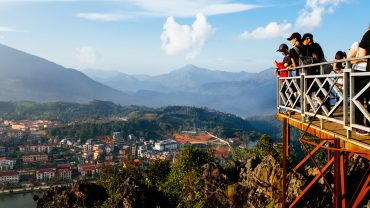Ever dreamt of cruising the Mekong Delta, getting lost in the bustling streets of Hanoi, or witnessing the majestic beauty of Ha Long Bay? We have! And guess what? As a US citizen, accessing these incredible experiences is easier than you think with the right Vietnam visa.
This comprehensive guide is your one-stop shop for everything you need to know about securing your Vietnam visa for US citizens. We’ll walk you through the different visa options, application processes, and even address some common questions. Ready to turn that dream of exploring Vietnam into a reality? Let’s dive in!
Vietnam Visa Options for US Citizens
Vietnam offers several visa options tailored for US citizens, each catering to different lengths of stay and travel purposes. Here’s a breakdown to help you choose the best fit for your Vietnamese adventure:
1. Vietnam E-Visa for US Citizens: Your Gateway to Short Stays
The Vietnam e-visa is perfect for US citizens planning a trip of 30 days or less for tourism, visiting relatives, or short business trips.
Why choose the e-visa?
- Convenience: The entire application process is online – no embassy visits or paperwork hassles!
- Speed: Get your visa approval within 3 working days.
- Affordability: The e-visa offers a budget-friendly way to enter Vietnam.
Pro-tip: Apply for your e-visa at least a week before your trip to allow ample processing time. You can find detailed information and apply for your e-visa on the official government website or reputable travel agencies like vntraveladvise.com.
2. Vietnam Visa on Arrival for US Citizens: Perfect for Longer Adventures
Dreaming of immersing yourself in Vietnam’s rich culture for more than a month? The visa on arrival is your answer. This visa is ideal for stays exceeding 30 days, multiple entries, or if your purpose of visit falls outside the e-visa’s scope.
Here’s how it works:
- Get your Approval Letter: You’ll need to apply for a visa approval letter online through a Vietnamese travel agency or the official government website.
- Visa Stamp on Arrival: Upon arrival at Vietnam’s international airports (Hanoi, Ho Chi Minh City, Da Nang), present your approval letter, passport, visa application form, and passport photos to receive your visa stamp.
Important note: While the visa on arrival is convenient, it’s crucial to apply for your approval letter in advance to avoid any delays at the airport.
3. Applying for a Visa at the Vietnamese Embassy or Consulate: The Traditional Route
For US citizens seeking longer stays, specific visa types (like student or work visas), or simply prefer a more traditional approach, applying directly at the Vietnamese Embassy or Consulate in the US is an option.
This process typically involves:
- Gathering required documents: You’ll need a valid passport, visa application form, passport photos, and supporting documents based on your visa type.
- Submitting your application: Mail your application or schedule an appointment at the embassy/consulate.
- Attending an interview: You might be called for an interview depending on your visa type.
Pro-tip: Check the specific requirements and processing times with the Vietnamese Embassy or Consulate in your area well in advance.
Frequently Asked Questions about Vietnam Visa for US Citizens
Navigating the world of visas can sometimes feel like deciphering ancient scrolls. We’ve compiled answers to some frequently asked questions to make your journey smoother:
How Much Does a Vietnam Visa Cost for US Citizens?
Visa fees vary depending on the type of visa, processing time, and your nationality. As of 2023, here’s a general estimate:
- E-visa: Around $25
- Visa on arrival (single entry – 1 month): $25 (stamping fee) + $17-$25 (approval letter processing fee)
- Visa on arrival (multiple entries or longer durations): Contact the embassy/consulate or your chosen travel agency for accurate pricing.
Note: Fees are subject to change, so it’s always best to check with official sources or your chosen visa service provider for the most up-to-date information.
How Long Can US Citizens Stay in Vietnam on a Tourist Visa?
The duration of your stay depends on the type of visa you obtain:
- E-visa: Allows a single entry and a maximum stay of 30 days.
- Tourist visa (obtained through the embassy/consulate or visa on arrival): Can allow for stays ranging from 1 to 3 months, with options for single or multiple entries.
Can I Extend My Vietnam Visa as a US Citizen?
Yes, it’s possible to extend your Vietnamese visa while you’re in the country. You can apply for an extension at the Vietnam Immigration Department in major cities like Hanoi, Ho Chi Minh City, and Da Nang.
It’s essential to start the extension process at least one week before your current visa expires to avoid overstaying, which can lead to penalties.
Is Travel Insurance Mandatory for US Citizens Visiting Vietnam?
While travel insurance is not mandatory for entering Vietnam, it’s highly recommended for all travelers, including US citizens. Travel insurance can provide financial protection in case of unexpected events like medical emergencies, flight cancellations, lost luggage, and more.
Expert Insight: “I always advise my clients to invest in comprehensive travel insurance. It provides peace of mind and can be a lifesaver in unforeseen situations,” says Nguyen Thi Lan, a seasoned travel consultant at Vietravel, a leading Vietnamese travel agency.
 Vietnamese Woman Smiling
Vietnamese Woman Smiling
Ready to Embrace the Magic of Vietnam?
Securing your Vietnam visa as a US citizen is the first step towards unlocking a world of breathtaking landscapes, vibrant culture, and unforgettable experiences. Whether you’re drawn to the ancient charm of Hoi An, the bustling energy of Ho Chi Minh City, or the tranquil beauty of Sapa’s rice terraces, Vietnam has something to captivate every traveler.
Start planning your trip, choose the visa option that best suits your needs, and prepare to be enchanted by the magic of Southeast Asia’s hidden gem!
Ready to explore more visa options? Check out our detailed guides on Vietnam visa costs for US citizens, applying for a Vietnam visa, and visa applications for US citizens.





Comment (0)